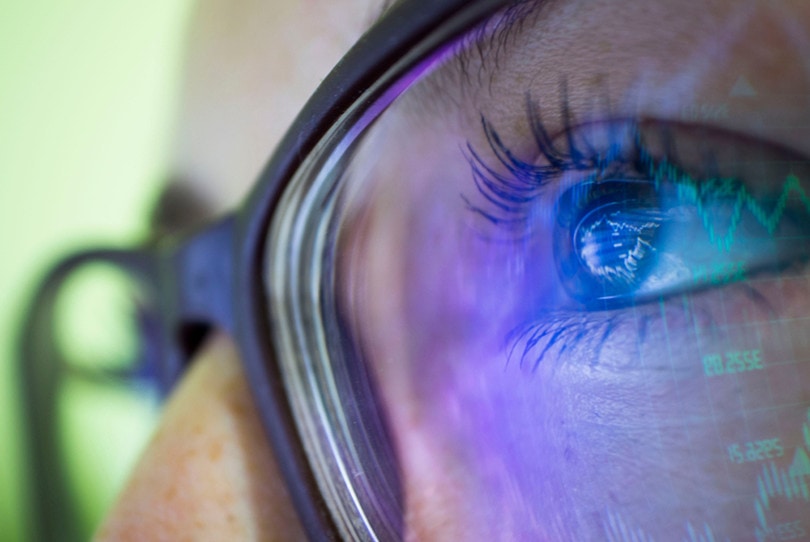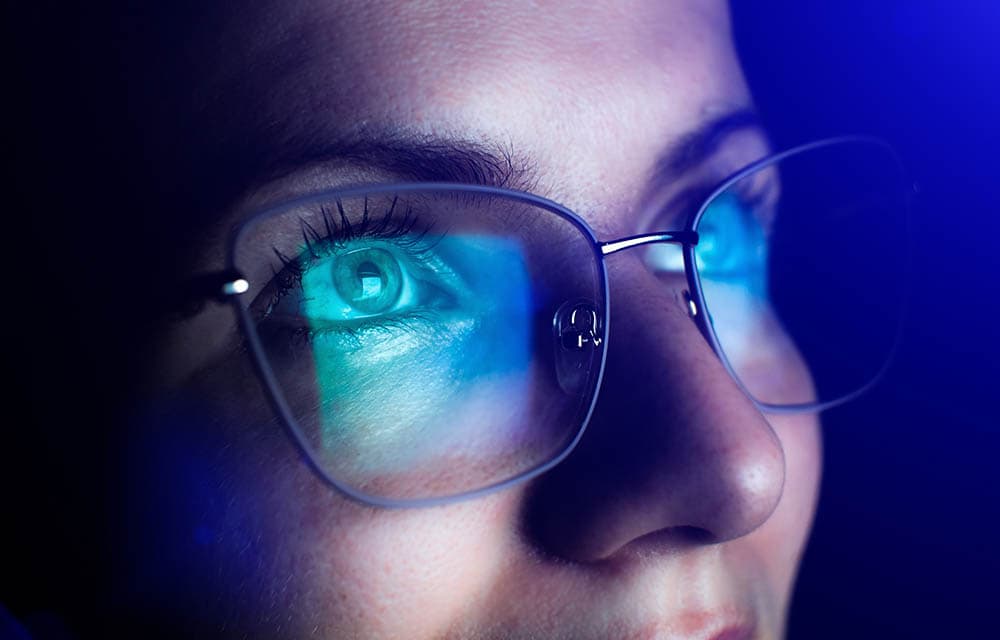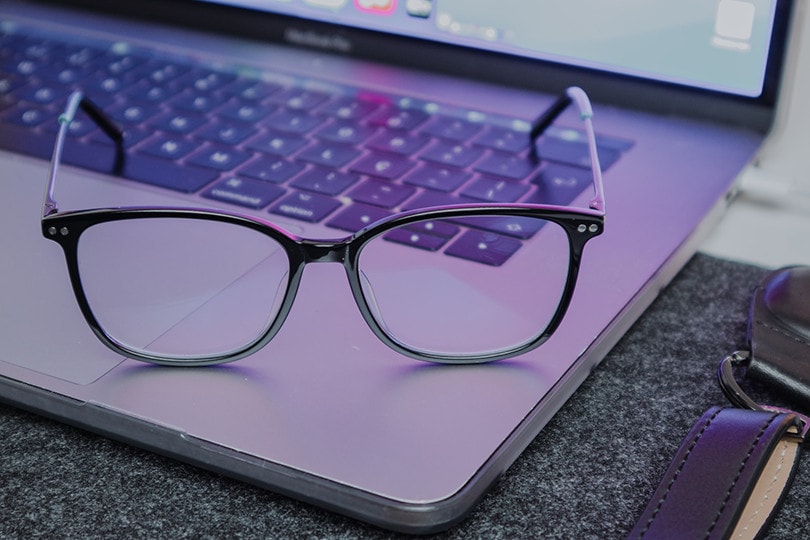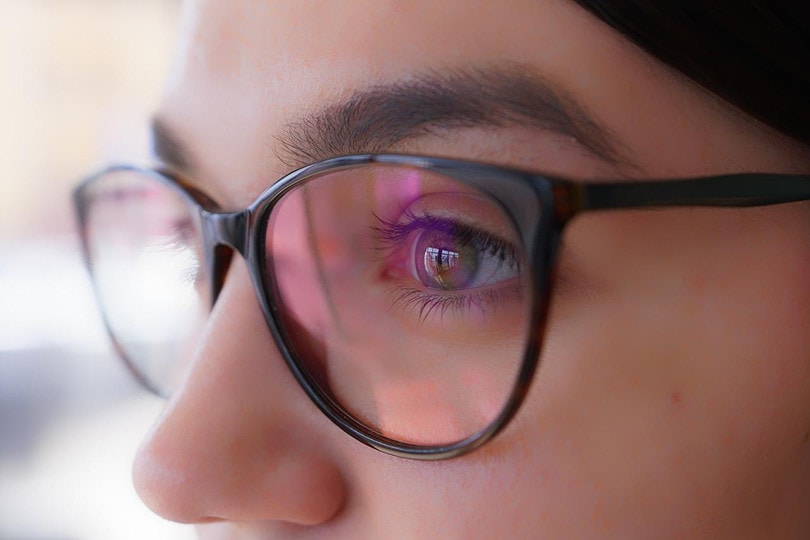Computer vs Blue Light Glasses: What is Right for You?
Last Updated on

Protective glasses are great to wear when you use your computer or other digital devices. With so many options on the market, however, it could be difficult to choose the right ones for your needs. There are so many different names and designs that it’s virtually impossible to know what’s what.
Learn the differences between computer glasses and blue light glasses, their pros and cons, and their uses, so you can make an educated choice on which will work best for you.

Overview of Computer Glasses:
Computer glasses, also known as computer screen glasses, are glasses that protect your eyes from computer screens and digital devices. The main purpose of computer screen glasses is to reduce digital eye strain, or Computer Vision Syndrome, which arises from looking at a digital screen for too long.
The symptoms of digital eye strain may include headaches, dry eyes, watery eyes, fatigue, and blurred vision. Ideally, we would reduce our screen time, but with so much work taking place online, that’s easier said than done.

How Computer Glasses Work
Computer glasses are designed to reduce eye strain, but it’s important to note that there’s no standardization in the protective eyewear industry. Computer glasses can include glasses with a blue-light filter or glasses that offer little difference between any other type of glasses.
Anti-glare, magnification, decentered pupillary distance, and other features may be part of computer glasses, but without blue-light filters, they don’t offer much eye protection. For computer glasses to be effective, they need a blue-light filter that covers the entire range of blue light on the color spectrum and an anti-glare coating that protects your eyes from reflections that lead to strain.
What Computer Glasses Are Good for

Quality computer glasses with the right features are effective at reducing digital eye strain and minimizing symptoms like fatigue, blurry vision, and headaches. This is only the case with true computer glasses, however, and not glasses that bear the name but offer no blue-light filter or anti-glare coating.
- May reduce digital eye strain
- Additional protective features
- Ideal for people who work with digital devices
- No standardization for computer glasses
- Efficacy varies

Overview of Blue Light Glasses:

Blue light glasses come in daytime designs and evening and nighttime designs. Both are intended purely to block out blue light from a smartphone, tablet, or computer monitor. They come in a wide range of price points and designs, and the lenses are typically amber-tinted.
Light is the most important factor in maintaining circadian rhythms, which are typically aligned with sunrise and sunset. Electronics and artificial light, including the blue light from devices, expose us to more light before sleep and can disrupt natural sleep. Chronic disruption of the sleep-wake cycle can lead to metabolic disorders or mental health conditions like depression.
How Blue Light Glasses Work
Blue light glasses have an orange or red tint that blocks blue light. Some blue light occurs naturally and isn’t harmful, but the excessive blue light that we’re exposed to from devices can be disruptive to natural sleep schedules. At night, humans aren’t supposed to be exposed to blue light. Just small amounts can impact the production of melatonin, which is responsible for sleep cycles.
To be effective, blue light glasses must filter the entire range of blue light on the color spectrum.
What Blue Light Glasses Are Good for

Blue light glasses are designed to filter out blue light. Over time, exposure to blue light can cause long-term disruption to the sleep-wake cycle. Tinted lenses block out the blue light to mimic more natural light conditions and promote a normal sleep-wake cycle.
- Filter blue light from electronics
- Promotes natural sleep cycles
- Day and nighttime versions
- Not all designs offer adequate protection
- Only protect from blue light

What’s the Difference Between Computer Glasses and Blue Light Glasses?
Basically, the key difference between computer glasses and blue light glasses is that computer glasses protect against a range of factors that impact digital eye strain, while blue light glasses protect against the damaging effects of blue light alone. Computer glasses may have a blue-light filter, but blue light glasses don’t often have additional features to protect your eyes. Blue light glasses also come in day and night versions, while computer glasses can be worn in both light conditions.
One of the similarities between them—and this is important for evaluating your options—is that neither is standardized. The prices and quality of each can vary significantly, and it’s crucial that you pay attention to the specifications to ensure you’re getting the protection you need.
With computer glasses, you want both an anti-glare coating and a blue-light filter to reduce the effects of digital eye strain. The blue-light filter, whether for computer glasses or blue light glasses, should protect against the entire range of blue light on the color spectrum.

Which Type of Glasses Should I Choose?
Which glasses you choose depends on your goals. If you’re concerned about digital eye strain, it’s best to get high-quality computer glasses. If you’re experiencing disturbances in your sleep-wake cycle, blue light glasses may be effective at reducing your symptoms.

Conclusion
Computer glasses may have a blue-light filter as part of their protection against digital eye strain, but blue light glasses are designed to protect only against the effects of blue light. Whichever you choose, it’s important to make sure you’re getting high-quality glasses that offer the protection you need.
Featured Image Credit: Igor Zvencom, Shutterstock,
Table of Contents
- Overview of Computer Glasses:
- How Computer Glasses Work
- What Computer Glasses Are Good for
- Overview of Blue Light Glasses:
- How Blue Light Glasses Work
- What Blue Light Glasses Are Good for
- What’s the Difference Between Computer Glasses and Blue Light Glasses?
- Which Type of Glasses Should I Choose?
- Conclusion
About the Author Robert Sparks
Robert’s obsession with all things optical started early in life, when his optician father would bring home prototypes for Robert to play with. Nowadays, Robert is dedicated to helping others find the right optics for their needs. His hobbies include astronomy, astrophysics, and model building. Originally from Newark, NJ, he resides in Santa Fe, New Mexico, where the nighttime skies are filled with glittering stars.
Related Articles:
How to Clean a Refractor Telescope: Step-by-Step Guide
How to Clean a Telescope Eyepiece: Step-by-Step Guide
How to Clean a Rifle Scope: 8 Expert Tips
Monocular vs Telescope: Differences Explained (With Pictures)
What Is a Monocular Used For? 8 Common Functions
How to Clean a Telescope Mirror: 8 Expert Tips
Brightfield vs Phase Contrast Microscopy: The Differences Explained
SkyCamHD Drone Review: Pros, Cons, FAQ, & Verdict
